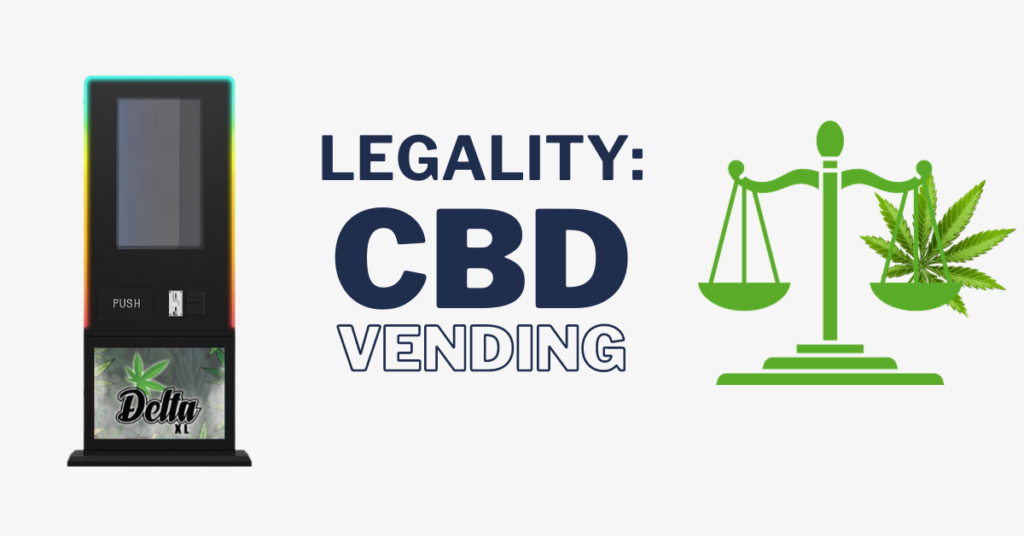
The legality of CBD vending machines is a topic of interest and confusion for many. In this article, we will explore the understanding of CBD and its legal status, as well as the emergence of CBD vending machines and the legal implications surrounding them. We will delve into the regulation and future possibilities of these machines within the cannabis industry, all while avoiding providing any legal or regulatory advice.
Understanding CBD and Its Legal Status
Before diving into the legality of CBD vending machines, it is crucial to understand what CBD is. CBD, or cannabidiol, is a chemical compound derived from the cannabis plant. Unlike tetrahydrocannabinol (THC), another compound found in cannabis, CBD does not produce psychoactive effects.
When it comes to the legal status of CBD, it is essential to consider federal laws governing its use and distribution.
What is CBD?
CBD is a non-intoxicating compound found in cannabis plants, including both hemp and marijuana. It has gained popularity for its potential therapeutic benefits, such as pain relief, reducing anxiety and stress, and aiding in better sleep quality.
One of the reasons CBD has become so popular is its versatility. It can be consumed in various forms, including oils, tinctures, capsules, edibles, and even topical creams. This wide range of options allows individuals to choose the method that best suits their needs and preferences.
Furthermore, CBD is known to interact with the body’s endocannabinoid system, which plays a crucial role in regulating various physiological processes, such as mood, appetite, sleep, and immune response. By interacting with this system, CBD may help restore balance and promote overall well-being.
Federal Laws Governing CBD
The legal status of CBD is primarily determined by federal laws. In 2018, the Farm Bill was passed, removing hemp and its derivatives, including CBD, from the list of controlled substances. This means that CBD derived from hemp, containing less than 0.3% THC, is legal at the federal level.
This change in legislation has opened up new opportunities for the CBD industry. Farmers can now legally cultivate hemp for CBD extraction, and companies can manufacture and distribute CBD products across state lines.
However, it is important to note that CBD derived from marijuana, which contains higher levels of THC, remains illegal under federal law. This discrepancy in legality between hemp-derived CBD and marijuana-derived CBD has created some confusion and challenges for businesses operating in the CBD space.
Additionally, the Food and Drug Administration (FDA) has regulatory authority over CBD products, prohibiting the marketing of CBD as dietary supplements or adding it to food and beverages. The FDA is currently in the process of evaluating the safety and efficacy of CBD, and it has approved only one CBD-based medication for the treatment of epilepsy.
As the CBD industry continues to grow, there is ongoing discussion and debate surrounding its legal status. Some states have implemented their own regulations and restrictions on CBD, creating a patchwork of laws across the country. It is crucial for consumers and businesses to stay informed about the evolving legal landscape to ensure compliance and make informed decisions.
In conclusion, CBD is a compound derived from the cannabis plant that offers potential therapeutic benefits. Its legal status is determined by federal laws, with hemp-derived CBD being legal at the federal level. However, regulations and restrictions vary across states, and the FDA has regulatory authority over CBD products. As the CBD industry evolves, it is important to stay informed about the changing legal landscape to navigate this emerging market successfully.
The Emergence of CBD Vending Machines
With the growing popularity and demand for CBD products, vending machines have emerged as a convenient way to access these goods. CBD vending machines offer a self-service experience, allowing customers to purchase CBD products on the spot.
But what exactly are CBD vending machines and how do they work? CBD vending machines function similarly to traditional vending machines, dispensing various CBD products such as oils, edibles, and topicals. They are often placed in locations with high foot traffic, like shopping malls, airports, and college campuses, offering a quick and discreet way to purchase CBD products.
The Concept of CBD Vending Machines
The concept of CBD vending machines is simple yet innovative. These machines are designed to provide a convenient and accessible solution for individuals seeking CBD products. By placing these vending machines in strategic locations, customers can easily find and purchase their desired CBD items without the need for a physical store or interacting with a salesperson.
Moreover, CBD vending machines are equipped with user-friendly interfaces that guide customers through the purchasing process. Customers can browse through the available products, select their desired item, and make a payment using cash, credit cards, or mobile payment methods. Once the transaction is complete, the vending machine dispenses the chosen CBD product, ensuring a seamless and efficient experience for the customer.
Popularity and Demand for CBD Vending Machines
The popularity and demand for CBD vending machines have been on the rise. Many people are looking for convenient ways to obtain CBD products, particularly for managing their well-being. CBD vending machines cater to this demand, providing a hassle-free purchasing experience.
Furthermore, CBD vending machines offer a level of discretion that traditional stores may not provide. Some individuals may feel more comfortable purchasing CBD products privately, without the need for face-to-face interactions or potential judgment from others. Vending machines allow customers to make their purchases discreetly, enhancing the overall shopping experience.
Moreover, CBD vending machines are not limited to just CBD products. Some vending machines offer a wider range of cannabis-related items. For example, THC vending machines provide access to products containing higher levels of THC, providing an alternative for individuals seeking a different experience. Similarly, Delta 8 vending machines offer products containing Delta 8 THC, a cannabinoid known for its mildly psychoactive effects.
In conclusion, CBD vending machines have emerged as a convenient and popular way to access CBD products. These machines provide a self-service experience, allowing customers to purchase CBD items quickly and discreetly. With their user-friendly interfaces and strategic placement in high foot traffic areas, CBD vending machines are meeting the growing demand for convenient and accessible CBD shopping options.
Legal Implications of CBD Vending Machines
While CBD vending machines have gained popularity, their legal implications vary depending on state laws and potential legal challenges and controversies.
State Laws and CBD Vending Machines
State laws play a significant role in determining the legality of CBD vending machines. Each state has its own regulations regarding the sale, possession, and distribution of CBD products. Some states have embraced the use of CBD vending machines, while others have imposed restrictions or even banned them altogether.
It is crucial for CBD vending machine operators to familiarize themselves with the specific laws in each state where they plan to operate to ensure compliance and avoid legal repercussions.
Legal Challenges and Controversies
With the evolving nature of cannabis laws and regulations, CBD vending machines may face legal challenges and controversies. Some concerns revolve around age restrictions, product quality and labeling, and the potential for unauthorized sales or underage access to CBD products.
Furthermore, while CBD derived from hemp is federally legal, the FDA has raised concerns about the lack of regulation and quality control in CBD products. This has led to debates and potential legal implications for CBD vending machine operators.
Regulation of CBD Vending Machines
Licensing and Permits for CBD Vending Machines
Obtaining the necessary licenses and permits is vital for CBD vending machine operators. This includes obtaining any required permits from local authorities and adhering to state-specific regulations for the sale of CBD products.
Compliance with Health and Safety Standards
Alongside licensing and permits, CBD vending machine operators must adhere to health and safety standards. This includes ensuring proper storage, labeling, and handling of CBD products, as well as maintaining cleanliness and regular maintenance of the vending machines themselves.
The Future of CBD Vending Machines
The future of CBD vending machines remains uncertain but holds promising potential within the cannabis industry.
Potential Legal Changes and Their Impact
As cannabis laws continue to evolve, it is possible that CBD vending machines may face changes in their legal status. It is crucial for operators to stay informed about potential legal changes and adapt accordingly to remain in compliance.
The Role of CBD Vending Machines in the Cannabis Industry
CBD vending machines, alongside THC vending machines and Delta 8 vending machines, play a significant role in the cannabis industry. They offer a convenient means of access to CBD products, providing consumers with a diverse range of options.
While the legality of CBD vending machines may vary, their emergence highlights the growing consumer demand for CBD and other cannabis-related products. As the cannabis industry continues to expand, innovative methods like vending machines may become more prevalent.
In conclusion, the legality of CBD vending machines is a multifaceted topic influenced by federal laws, state regulations, and potential legal challenges. Operators of CBD vending machines must navigate these complexities, ensuring compliance with regulations, licensing, and safety measures. As the cannabis industry evolves, CBD vending machines, along with THC vending machines and Delta 8 vending machines, offer a glimpse into the future of easy access to a variety of cannabis-related products.


